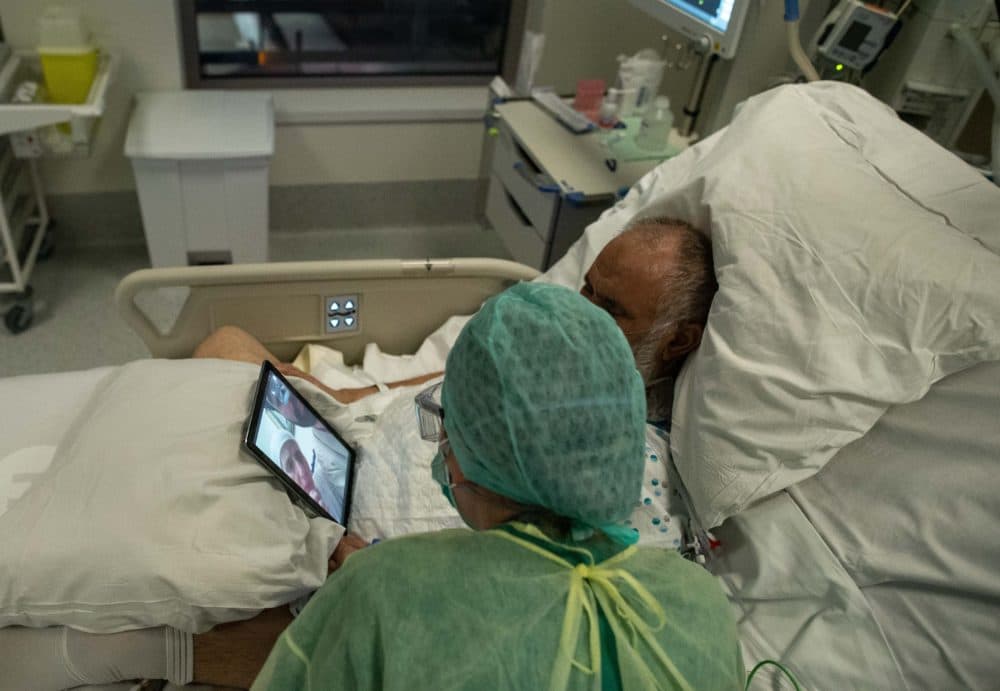Advertisement
Patient Advocacy Group Offers Advice For Sick Loved Ones And Families Facing Coronavirus

Navigating the medical system can be trying in regular times — but during the COVID-19 pandemic, it's become a nightmare for families who can't be with sick loved ones in the hospital.
“It's a very unfamiliar space that people are now confronting, trying to contact their doctor, go to the hospital or stay connected with loved ones,” says Rebecca Kirch, executive vice president of health care at the nonprofit Patient Advocate Foundation.
But there are ways to face the reality of the overwhelmed health care system and remain in close contact with loved ones, she says.
Communication Is Key
To stay in communication and get updates from doctors or nurses, Kirch says to make sure the hospital or care facility has the correct information on record for the patient’s primary contact person.
Health care professionals are documenting that contact information in patients’ medical records and writing it on whiteboards in patients’ rooms for easy accessibility, she says.
“I think the most important part is that your contact name is available and there is someone who will answer the call,” she says. “I know doctors and nurses are going out of their way to stay in touch with families, but it's harder now just because of how stressed they are in terms of time with each patient.”
Because many hospitals are not allowing visitors, Kirch advises patients to bring their smartphones or tablets in order to virtually communicate with friends and family outside of the care facility. Doctors and nurses can also use those devices to share updates with loved ones on the progress of the sick patient.
“[Health care teams] are talking to the loved ones and holding the phone near to the patient's ear so that they can still help coach them through the conversations that need to be had, even with those patients who are intubated and cannot speak,” she says.
Advertisement
Plan Ahead Of Time
Kirch recommends taking some time to plan ahead in the event you or someone in your family becomes ill. Identify emergency contacts and who should speak on your behalf if you’re too ill to do so, she says.
While at home, think about necessities you may accidentally leave behind when heading to the hospital, she says, from reading glasses to dentures and device chargers.
Take Detailed Notes
Because of measures to contain the coronavirus, it’s likely you won’t physically meet the nurse or doctor caring for your sick loved one. Kirch says to write down and keep track of the health care professionals you interact with either virtually or over the phone.
“It's very helpful to keep track of all of the people that you've talked to,” she says. “It could be many, many different people.”
Take Advantage Of Additional Medical And Financial Resources
Kirch says the Patient Advocate Foundation has set up a COVID-19 hotline to help people get through these trying times. The Foundation has case managers available by phone to help answer questions about financial stressors such as insurance and hospital bills.
“The financial toxicity that patients are facing now is very real,” she says.
The Foundation also has online medical care planning resources and webinars on relief funds, nutrition, insurance, housing, legislation and more.
It may be difficult to access additional departments, such as the billing department or pharmacy, when a loved one is in the hospital during the coronavirus crisis. That’s an “extra challenge” added to an already stressful situation, Kirch says.
“You're going to need some extra layers of support to get through the other side when the bills start rolling in,” she says. “We don't really know what the landscape will be like on the other side of this, and that's where advocacy and support tools will be particularly helpful for people.”
Karyn Miller-Medzon produced and edited this interview for broadcast with Kathleen McKenna. Serena McMahon adapted it for the web.
This segment aired on April 15, 2020.

